Strategic Planning for the Hospitality Industry - LT6018GN
VerifiedAdded on 2023/01/18
|12
|4234
|30
Report
AI Summary
This report provides a comprehensive analysis of strategic planning within the hospitality industry, using the ME London Hotel as a case study. It delves into the factors influencing the implementation of strategies across various business functions, including management style, organizational structure, human resources management, and information and control systems. The report evaluates the effectiveness of different performance metrics, such as critical success factors, and their role in guiding business strategies. Furthermore, it explores key elements for managing strategic change, encompassing employee requirements, workplace culture, and organizational size, to ensure successful adaptation and sustainability within the dynamic hospitality environment. The report offers insights into how strategic planning can navigate challenges and achieve organizational goals.
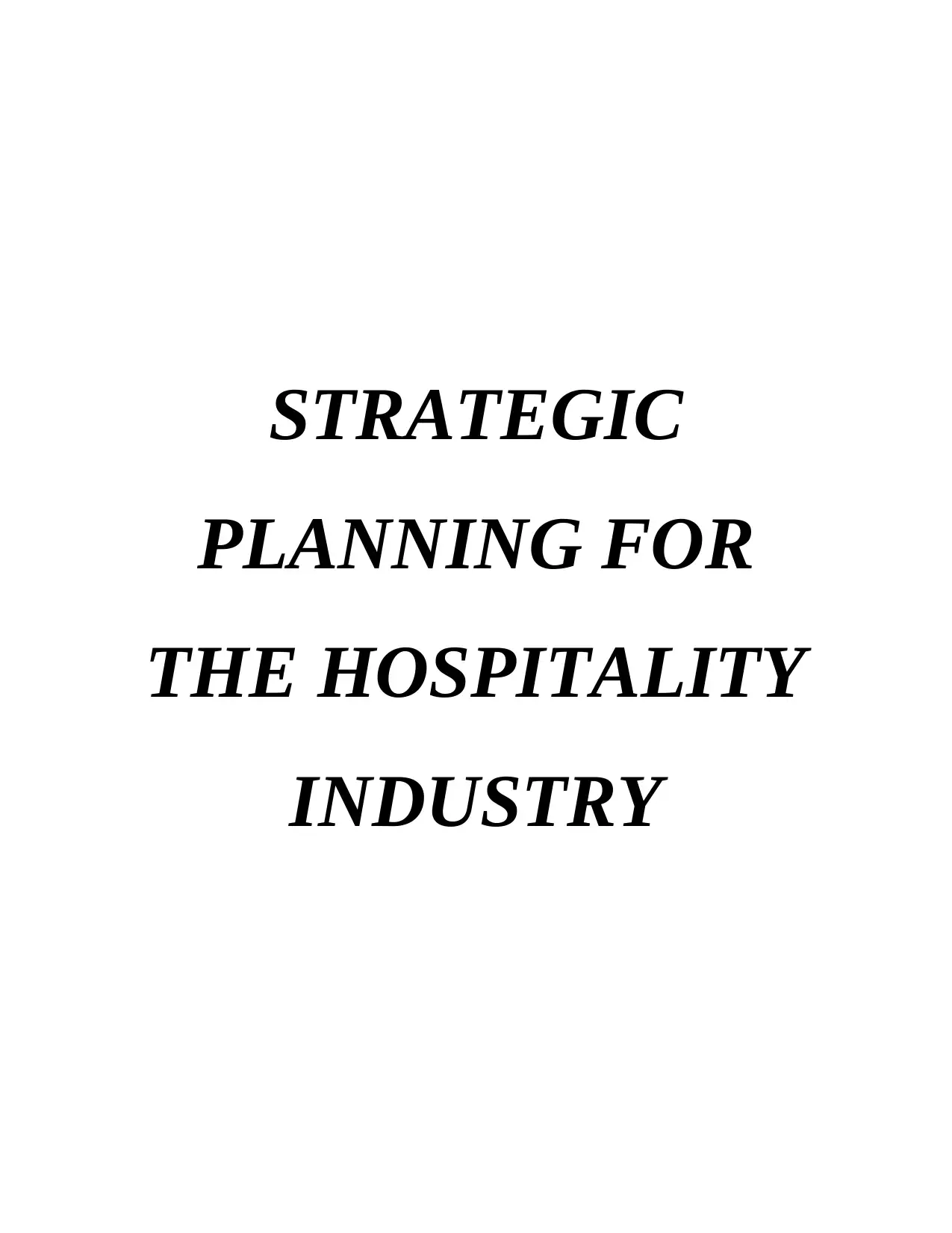
STRATEGIC
PLANNING FOR
THE HOSPITALITY
INDUSTRY
PLANNING FOR
THE HOSPITALITY
INDUSTRY
Paraphrase This Document
Need a fresh take? Get an instant paraphrase of this document with our AI Paraphraser
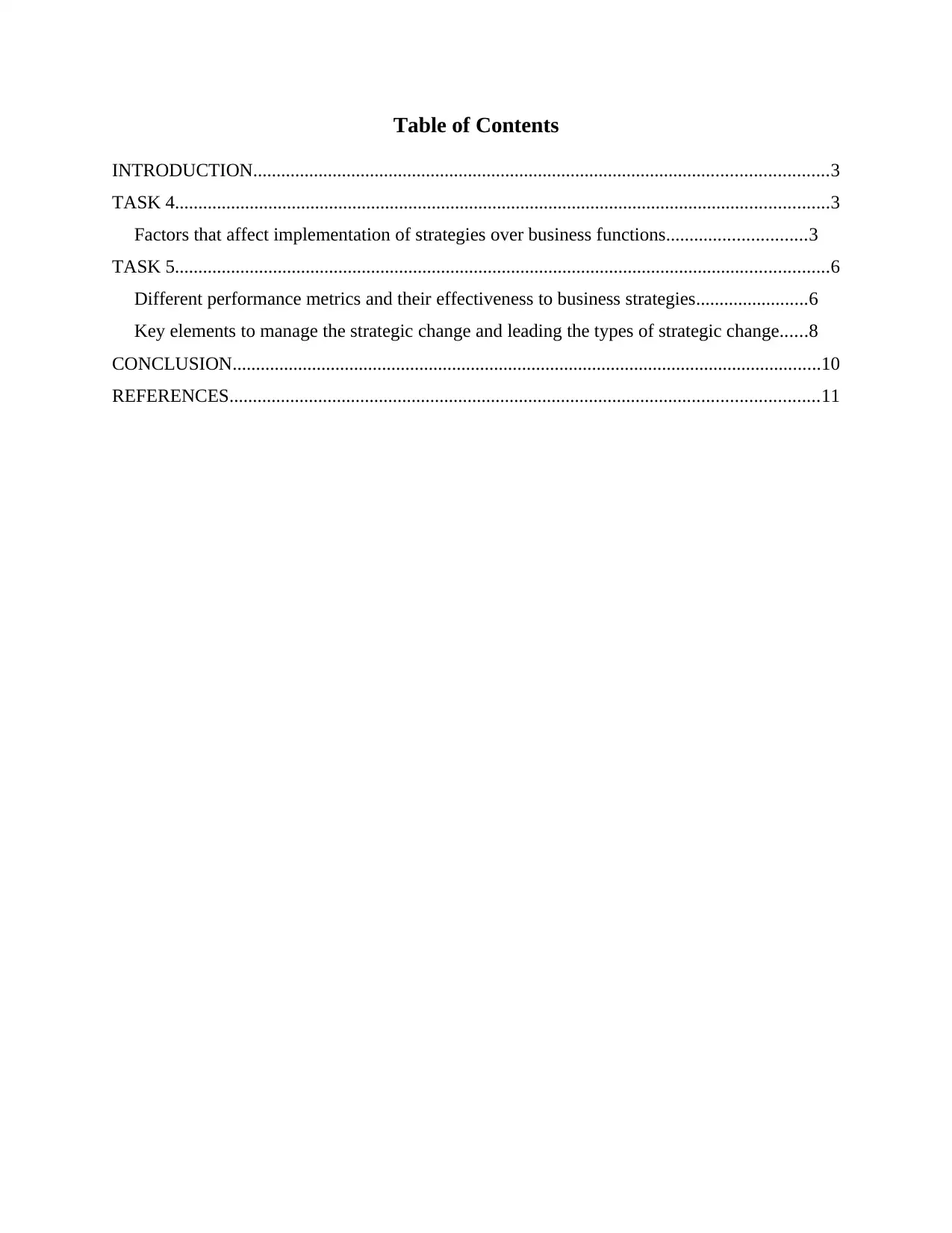
Table of Contents
INTRODUCTION...........................................................................................................................3
TASK 4............................................................................................................................................3
Factors that affect implementation of strategies over business functions..............................3
TASK 5............................................................................................................................................6
Different performance metrics and their effectiveness to business strategies........................6
Key elements to manage the strategic change and leading the types of strategic change......8
CONCLUSION..............................................................................................................................10
REFERENCES..............................................................................................................................11
INTRODUCTION...........................................................................................................................3
TASK 4............................................................................................................................................3
Factors that affect implementation of strategies over business functions..............................3
TASK 5............................................................................................................................................6
Different performance metrics and their effectiveness to business strategies........................6
Key elements to manage the strategic change and leading the types of strategic change......8
CONCLUSION..............................................................................................................................10
REFERENCES..............................................................................................................................11
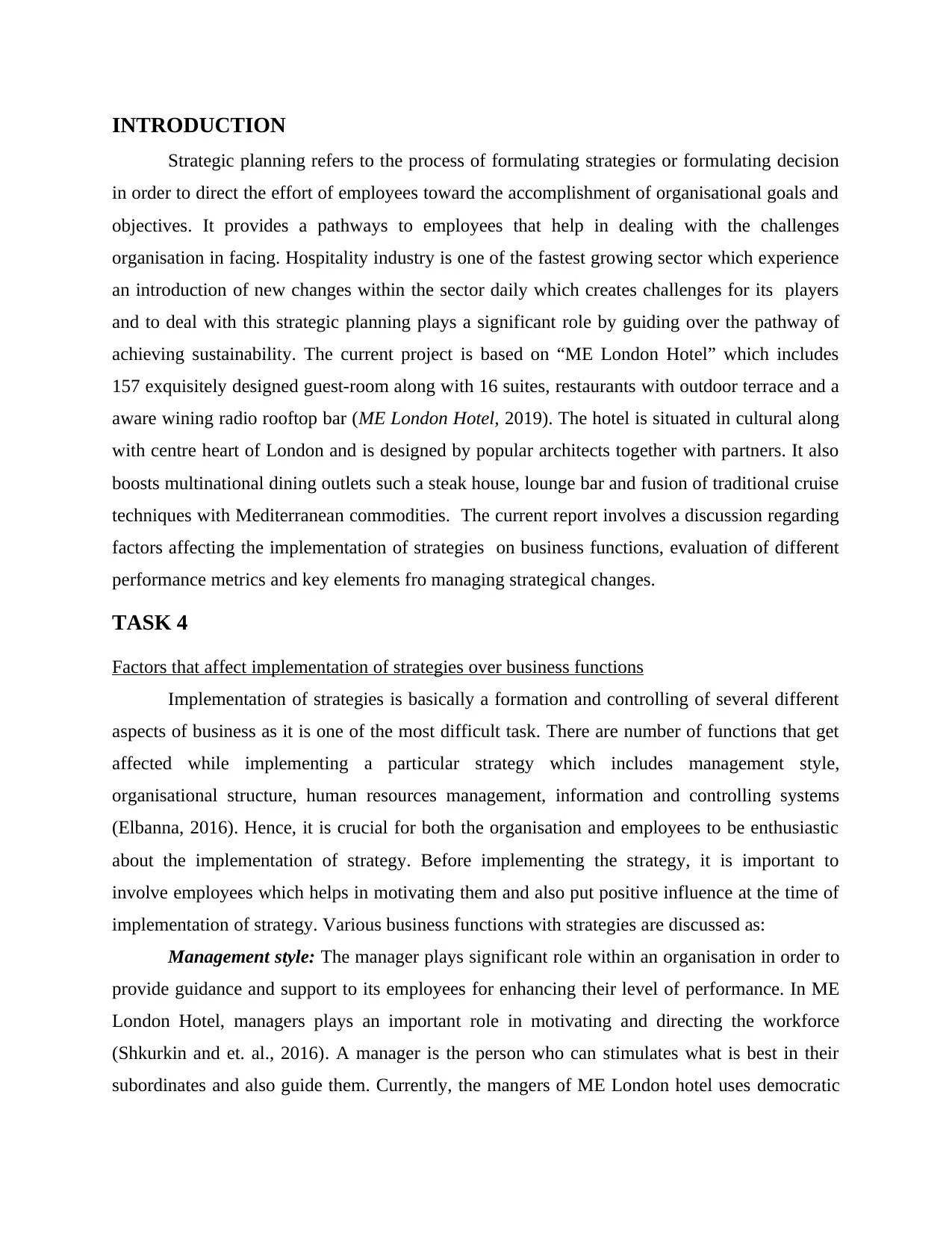
INTRODUCTION
Strategic planning refers to the process of formulating strategies or formulating decision
in order to direct the effort of employees toward the accomplishment of organisational goals and
objectives. It provides a pathways to employees that help in dealing with the challenges
organisation in facing. Hospitality industry is one of the fastest growing sector which experience
an introduction of new changes within the sector daily which creates challenges for its players
and to deal with this strategic planning plays a significant role by guiding over the pathway of
achieving sustainability. The current project is based on “ME London Hotel” which includes
157 exquisitely designed guest-room along with 16 suites, restaurants with outdoor terrace and a
aware wining radio rooftop bar (ME London Hotel, 2019). The hotel is situated in cultural along
with centre heart of London and is designed by popular architects together with partners. It also
boosts multinational dining outlets such a steak house, lounge bar and fusion of traditional cruise
techniques with Mediterranean commodities. The current report involves a discussion regarding
factors affecting the implementation of strategies on business functions, evaluation of different
performance metrics and key elements fro managing strategical changes.
TASK 4
Factors that affect implementation of strategies over business functions
Implementation of strategies is basically a formation and controlling of several different
aspects of business as it is one of the most difficult task. There are number of functions that get
affected while implementing a particular strategy which includes management style,
organisational structure, human resources management, information and controlling systems
(Elbanna, 2016). Hence, it is crucial for both the organisation and employees to be enthusiastic
about the implementation of strategy. Before implementing the strategy, it is important to
involve employees which helps in motivating them and also put positive influence at the time of
implementation of strategy. Various business functions with strategies are discussed as:
Management style: The manager plays significant role within an organisation in order to
provide guidance and support to its employees for enhancing their level of performance. In ME
London Hotel, managers plays an important role in motivating and directing the workforce
(Shkurkin and et. al., 2016). A manager is the person who can stimulates what is best in their
subordinates and also guide them. Currently, the mangers of ME London hotel uses democratic
Strategic planning refers to the process of formulating strategies or formulating decision
in order to direct the effort of employees toward the accomplishment of organisational goals and
objectives. It provides a pathways to employees that help in dealing with the challenges
organisation in facing. Hospitality industry is one of the fastest growing sector which experience
an introduction of new changes within the sector daily which creates challenges for its players
and to deal with this strategic planning plays a significant role by guiding over the pathway of
achieving sustainability. The current project is based on “ME London Hotel” which includes
157 exquisitely designed guest-room along with 16 suites, restaurants with outdoor terrace and a
aware wining radio rooftop bar (ME London Hotel, 2019). The hotel is situated in cultural along
with centre heart of London and is designed by popular architects together with partners. It also
boosts multinational dining outlets such a steak house, lounge bar and fusion of traditional cruise
techniques with Mediterranean commodities. The current report involves a discussion regarding
factors affecting the implementation of strategies on business functions, evaluation of different
performance metrics and key elements fro managing strategical changes.
TASK 4
Factors that affect implementation of strategies over business functions
Implementation of strategies is basically a formation and controlling of several different
aspects of business as it is one of the most difficult task. There are number of functions that get
affected while implementing a particular strategy which includes management style,
organisational structure, human resources management, information and controlling systems
(Elbanna, 2016). Hence, it is crucial for both the organisation and employees to be enthusiastic
about the implementation of strategy. Before implementing the strategy, it is important to
involve employees which helps in motivating them and also put positive influence at the time of
implementation of strategy. Various business functions with strategies are discussed as:
Management style: The manager plays significant role within an organisation in order to
provide guidance and support to its employees for enhancing their level of performance. In ME
London Hotel, managers plays an important role in motivating and directing the workforce
(Shkurkin and et. al., 2016). A manager is the person who can stimulates what is best in their
subordinates and also guide them. Currently, the mangers of ME London hotel uses democratic
⊘ This is a preview!⊘
Do you want full access?
Subscribe today to unlock all pages.

Trusted by 1+ million students worldwide
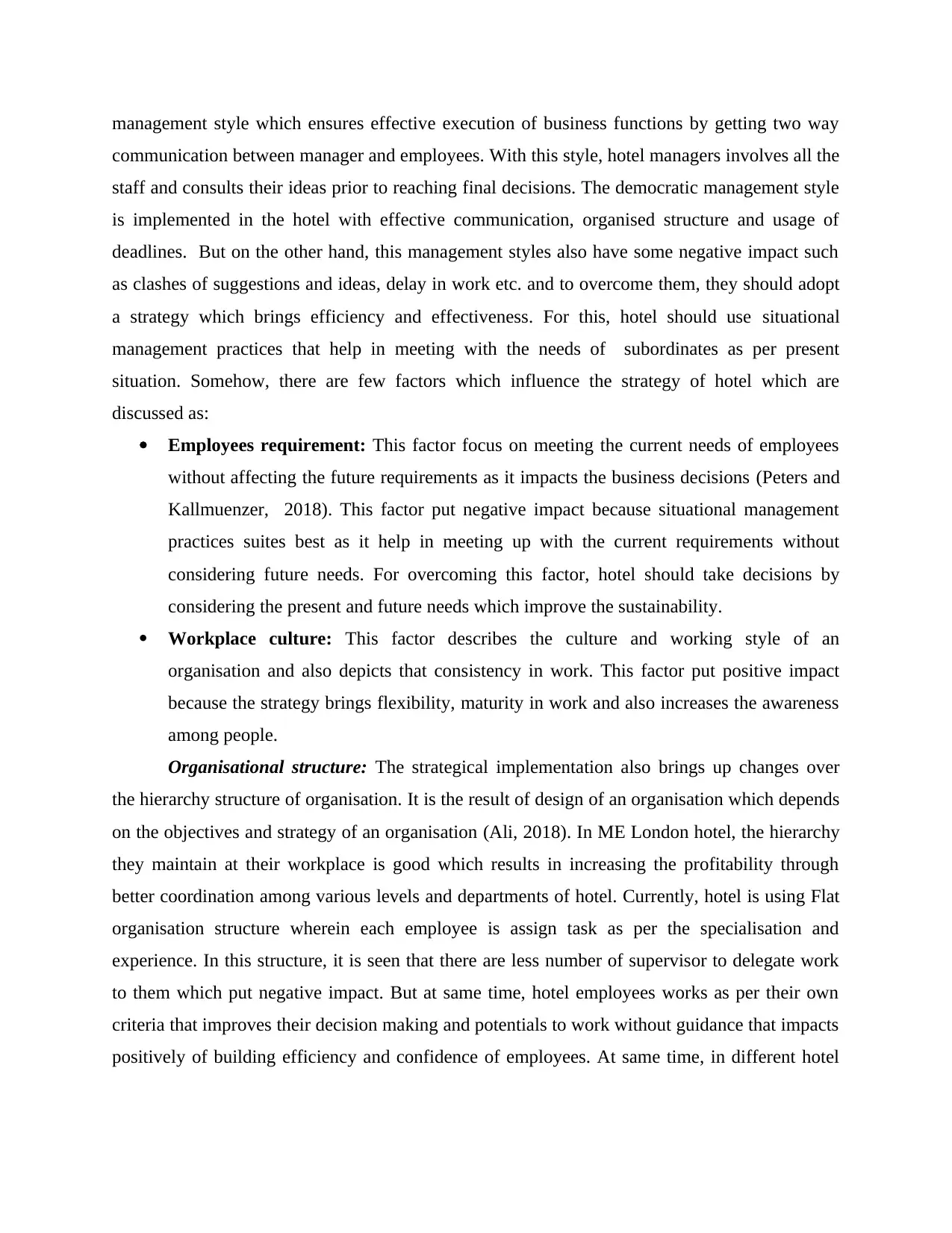
management style which ensures effective execution of business functions by getting two way
communication between manager and employees. With this style, hotel managers involves all the
staff and consults their ideas prior to reaching final decisions. The democratic management style
is implemented in the hotel with effective communication, organised structure and usage of
deadlines. But on the other hand, this management styles also have some negative impact such
as clashes of suggestions and ideas, delay in work etc. and to overcome them, they should adopt
a strategy which brings efficiency and effectiveness. For this, hotel should use situational
management practices that help in meeting with the needs of subordinates as per present
situation. Somehow, there are few factors which influence the strategy of hotel which are
discussed as:
Employees requirement: This factor focus on meeting the current needs of employees
without affecting the future requirements as it impacts the business decisions (Peters and
Kallmuenzer, 2018). This factor put negative impact because situational management
practices suites best as it help in meeting up with the current requirements without
considering future needs. For overcoming this factor, hotel should take decisions by
considering the present and future needs which improve the sustainability.
Workplace culture: This factor describes the culture and working style of an
organisation and also depicts that consistency in work. This factor put positive impact
because the strategy brings flexibility, maturity in work and also increases the awareness
among people.
Organisational structure: The strategical implementation also brings up changes over
the hierarchy structure of organisation. It is the result of design of an organisation which depends
on the objectives and strategy of an organisation (Ali, 2018). In ME London hotel, the hierarchy
they maintain at their workplace is good which results in increasing the profitability through
better coordination among various levels and departments of hotel. Currently, hotel is using Flat
organisation structure wherein each employee is assign task as per the specialisation and
experience. In this structure, it is seen that there are less number of supervisor to delegate work
to them which put negative impact. But at same time, hotel employees works as per their own
criteria that improves their decision making and potentials to work without guidance that impacts
positively of building efficiency and confidence of employees. At same time, in different hotel
communication between manager and employees. With this style, hotel managers involves all the
staff and consults their ideas prior to reaching final decisions. The democratic management style
is implemented in the hotel with effective communication, organised structure and usage of
deadlines. But on the other hand, this management styles also have some negative impact such
as clashes of suggestions and ideas, delay in work etc. and to overcome them, they should adopt
a strategy which brings efficiency and effectiveness. For this, hotel should use situational
management practices that help in meeting with the needs of subordinates as per present
situation. Somehow, there are few factors which influence the strategy of hotel which are
discussed as:
Employees requirement: This factor focus on meeting the current needs of employees
without affecting the future requirements as it impacts the business decisions (Peters and
Kallmuenzer, 2018). This factor put negative impact because situational management
practices suites best as it help in meeting up with the current requirements without
considering future needs. For overcoming this factor, hotel should take decisions by
considering the present and future needs which improve the sustainability.
Workplace culture: This factor describes the culture and working style of an
organisation and also depicts that consistency in work. This factor put positive impact
because the strategy brings flexibility, maturity in work and also increases the awareness
among people.
Organisational structure: The strategical implementation also brings up changes over
the hierarchy structure of organisation. It is the result of design of an organisation which depends
on the objectives and strategy of an organisation (Ali, 2018). In ME London hotel, the hierarchy
they maintain at their workplace is good which results in increasing the profitability through
better coordination among various levels and departments of hotel. Currently, hotel is using Flat
organisation structure wherein each employee is assign task as per the specialisation and
experience. In this structure, it is seen that there are less number of supervisor to delegate work
to them which put negative impact. But at same time, hotel employees works as per their own
criteria that improves their decision making and potentials to work without guidance that impacts
positively of building efficiency and confidence of employees. At same time, in different hotel
Paraphrase This Document
Need a fresh take? Get an instant paraphrase of this document with our AI Paraphraser
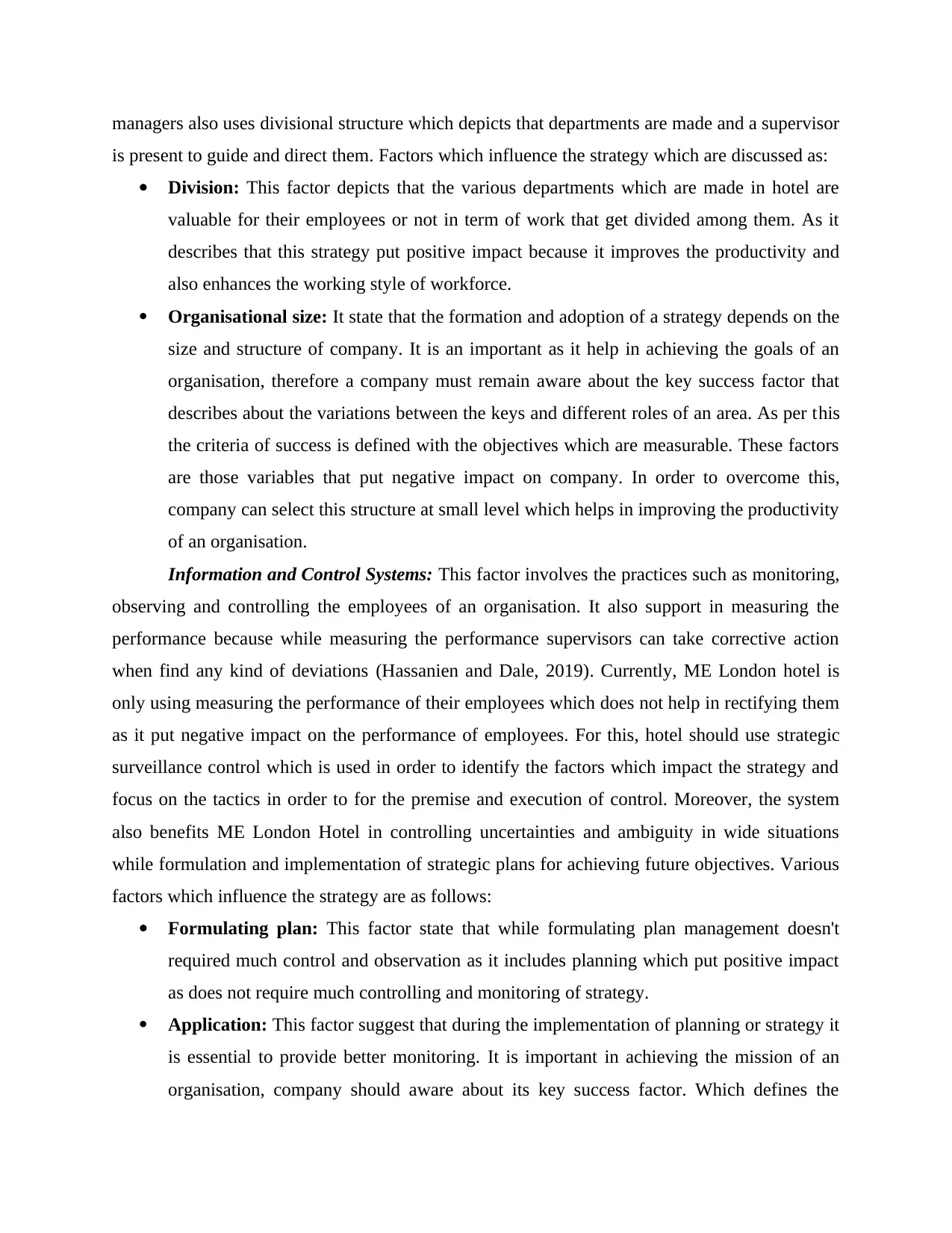
managers also uses divisional structure which depicts that departments are made and a supervisor
is present to guide and direct them. Factors which influence the strategy which are discussed as:
Division: This factor depicts that the various departments which are made in hotel are
valuable for their employees or not in term of work that get divided among them. As it
describes that this strategy put positive impact because it improves the productivity and
also enhances the working style of workforce.
Organisational size: It state that the formation and adoption of a strategy depends on the
size and structure of company. It is an important as it help in achieving the goals of an
organisation, therefore a company must remain aware about the key success factor that
describes about the variations between the keys and different roles of an area. As per this
the criteria of success is defined with the objectives which are measurable. These factors
are those variables that put negative impact on company. In order to overcome this,
company can select this structure at small level which helps in improving the productivity
of an organisation.
Information and Control Systems: This factor involves the practices such as monitoring,
observing and controlling the employees of an organisation. It also support in measuring the
performance because while measuring the performance supervisors can take corrective action
when find any kind of deviations (Hassanien and Dale, 2019). Currently, ME London hotel is
only using measuring the performance of their employees which does not help in rectifying them
as it put negative impact on the performance of employees. For this, hotel should use strategic
surveillance control which is used in order to identify the factors which impact the strategy and
focus on the tactics in order to for the premise and execution of control. Moreover, the system
also benefits ME London Hotel in controlling uncertainties and ambiguity in wide situations
while formulation and implementation of strategic plans for achieving future objectives. Various
factors which influence the strategy are as follows:
Formulating plan: This factor state that while formulating plan management doesn't
required much control and observation as it includes planning which put positive impact
as does not require much controlling and monitoring of strategy.
Application: This factor suggest that during the implementation of planning or strategy it
is essential to provide better monitoring. It is important in achieving the mission of an
organisation, company should aware about its key success factor. Which defines the
is present to guide and direct them. Factors which influence the strategy which are discussed as:
Division: This factor depicts that the various departments which are made in hotel are
valuable for their employees or not in term of work that get divided among them. As it
describes that this strategy put positive impact because it improves the productivity and
also enhances the working style of workforce.
Organisational size: It state that the formation and adoption of a strategy depends on the
size and structure of company. It is an important as it help in achieving the goals of an
organisation, therefore a company must remain aware about the key success factor that
describes about the variations between the keys and different roles of an area. As per this
the criteria of success is defined with the objectives which are measurable. These factors
are those variables that put negative impact on company. In order to overcome this,
company can select this structure at small level which helps in improving the productivity
of an organisation.
Information and Control Systems: This factor involves the practices such as monitoring,
observing and controlling the employees of an organisation. It also support in measuring the
performance because while measuring the performance supervisors can take corrective action
when find any kind of deviations (Hassanien and Dale, 2019). Currently, ME London hotel is
only using measuring the performance of their employees which does not help in rectifying them
as it put negative impact on the performance of employees. For this, hotel should use strategic
surveillance control which is used in order to identify the factors which impact the strategy and
focus on the tactics in order to for the premise and execution of control. Moreover, the system
also benefits ME London Hotel in controlling uncertainties and ambiguity in wide situations
while formulation and implementation of strategic plans for achieving future objectives. Various
factors which influence the strategy are as follows:
Formulating plan: This factor state that while formulating plan management doesn't
required much control and observation as it includes planning which put positive impact
as does not require much controlling and monitoring of strategy.
Application: This factor suggest that during the implementation of planning or strategy it
is essential to provide better monitoring. It is important in achieving the mission of an
organisation, company should aware about its key success factor. Which defines the
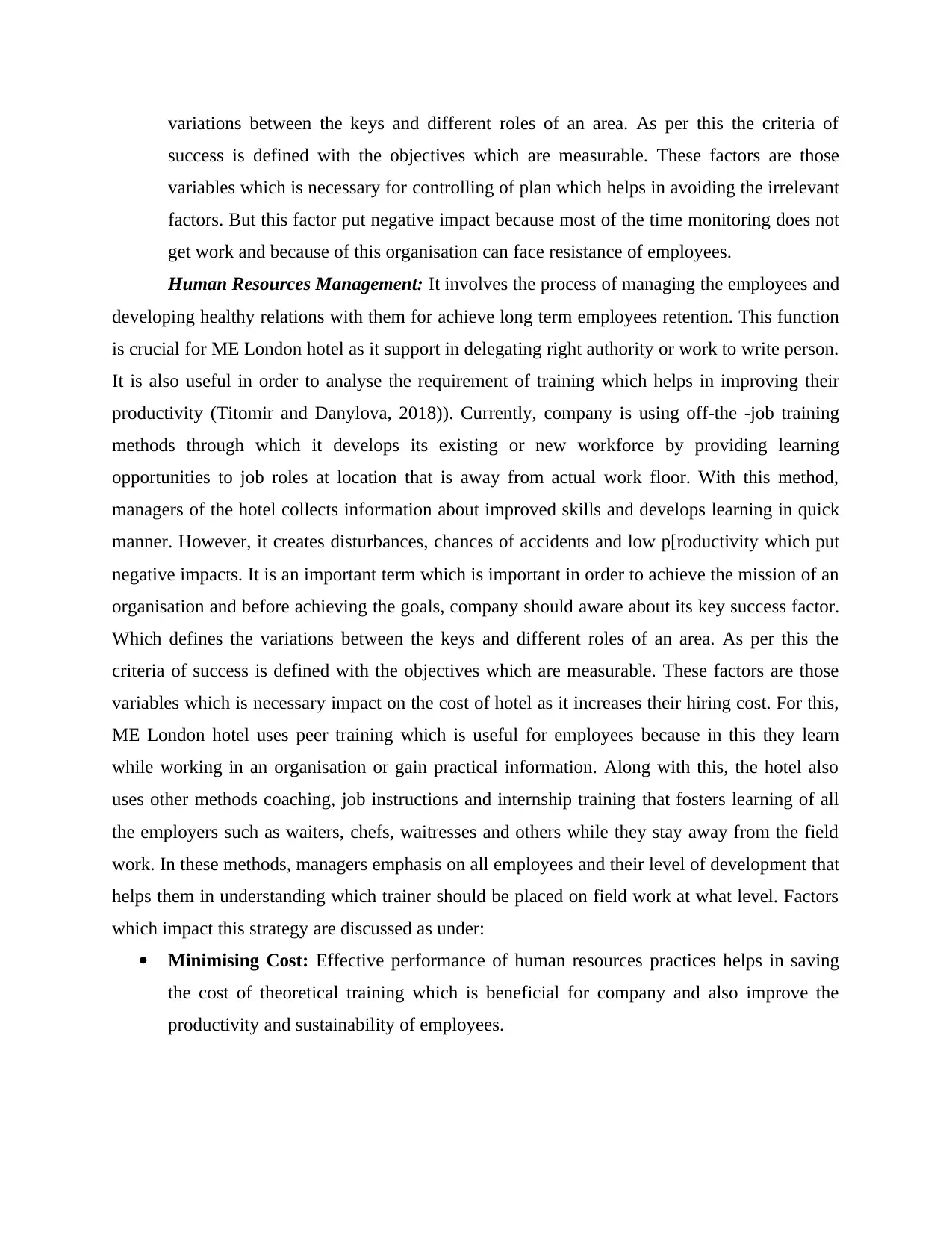
variations between the keys and different roles of an area. As per this the criteria of
success is defined with the objectives which are measurable. These factors are those
variables which is necessary for controlling of plan which helps in avoiding the irrelevant
factors. But this factor put negative impact because most of the time monitoring does not
get work and because of this organisation can face resistance of employees.
Human Resources Management: It involves the process of managing the employees and
developing healthy relations with them for achieve long term employees retention. This function
is crucial for ME London hotel as it support in delegating right authority or work to write person.
It is also useful in order to analyse the requirement of training which helps in improving their
productivity (Titomir and Danylova, 2018)). Currently, company is using off-the -job training
methods through which it develops its existing or new workforce by providing learning
opportunities to job roles at location that is away from actual work floor. With this method,
managers of the hotel collects information about improved skills and develops learning in quick
manner. However, it creates disturbances, chances of accidents and low p[roductivity which put
negative impacts. It is an important term which is important in order to achieve the mission of an
organisation and before achieving the goals, company should aware about its key success factor.
Which defines the variations between the keys and different roles of an area. As per this the
criteria of success is defined with the objectives which are measurable. These factors are those
variables which is necessary impact on the cost of hotel as it increases their hiring cost. For this,
ME London hotel uses peer training which is useful for employees because in this they learn
while working in an organisation or gain practical information. Along with this, the hotel also
uses other methods coaching, job instructions and internship training that fosters learning of all
the employers such as waiters, chefs, waitresses and others while they stay away from the field
work. In these methods, managers emphasis on all employees and their level of development that
helps them in understanding which trainer should be placed on field work at what level. Factors
which impact this strategy are discussed as under:
Minimising Cost: Effective performance of human resources practices helps in saving
the cost of theoretical training which is beneficial for company and also improve the
productivity and sustainability of employees.
success is defined with the objectives which are measurable. These factors are those
variables which is necessary for controlling of plan which helps in avoiding the irrelevant
factors. But this factor put negative impact because most of the time monitoring does not
get work and because of this organisation can face resistance of employees.
Human Resources Management: It involves the process of managing the employees and
developing healthy relations with them for achieve long term employees retention. This function
is crucial for ME London hotel as it support in delegating right authority or work to write person.
It is also useful in order to analyse the requirement of training which helps in improving their
productivity (Titomir and Danylova, 2018)). Currently, company is using off-the -job training
methods through which it develops its existing or new workforce by providing learning
opportunities to job roles at location that is away from actual work floor. With this method,
managers of the hotel collects information about improved skills and develops learning in quick
manner. However, it creates disturbances, chances of accidents and low p[roductivity which put
negative impacts. It is an important term which is important in order to achieve the mission of an
organisation and before achieving the goals, company should aware about its key success factor.
Which defines the variations between the keys and different roles of an area. As per this the
criteria of success is defined with the objectives which are measurable. These factors are those
variables which is necessary impact on the cost of hotel as it increases their hiring cost. For this,
ME London hotel uses peer training which is useful for employees because in this they learn
while working in an organisation or gain practical information. Along with this, the hotel also
uses other methods coaching, job instructions and internship training that fosters learning of all
the employers such as waiters, chefs, waitresses and others while they stay away from the field
work. In these methods, managers emphasis on all employees and their level of development that
helps them in understanding which trainer should be placed on field work at what level. Factors
which impact this strategy are discussed as under:
Minimising Cost: Effective performance of human resources practices helps in saving
the cost of theoretical training which is beneficial for company and also improve the
productivity and sustainability of employees.
⊘ This is a preview!⊘
Do you want full access?
Subscribe today to unlock all pages.

Trusted by 1+ million students worldwide
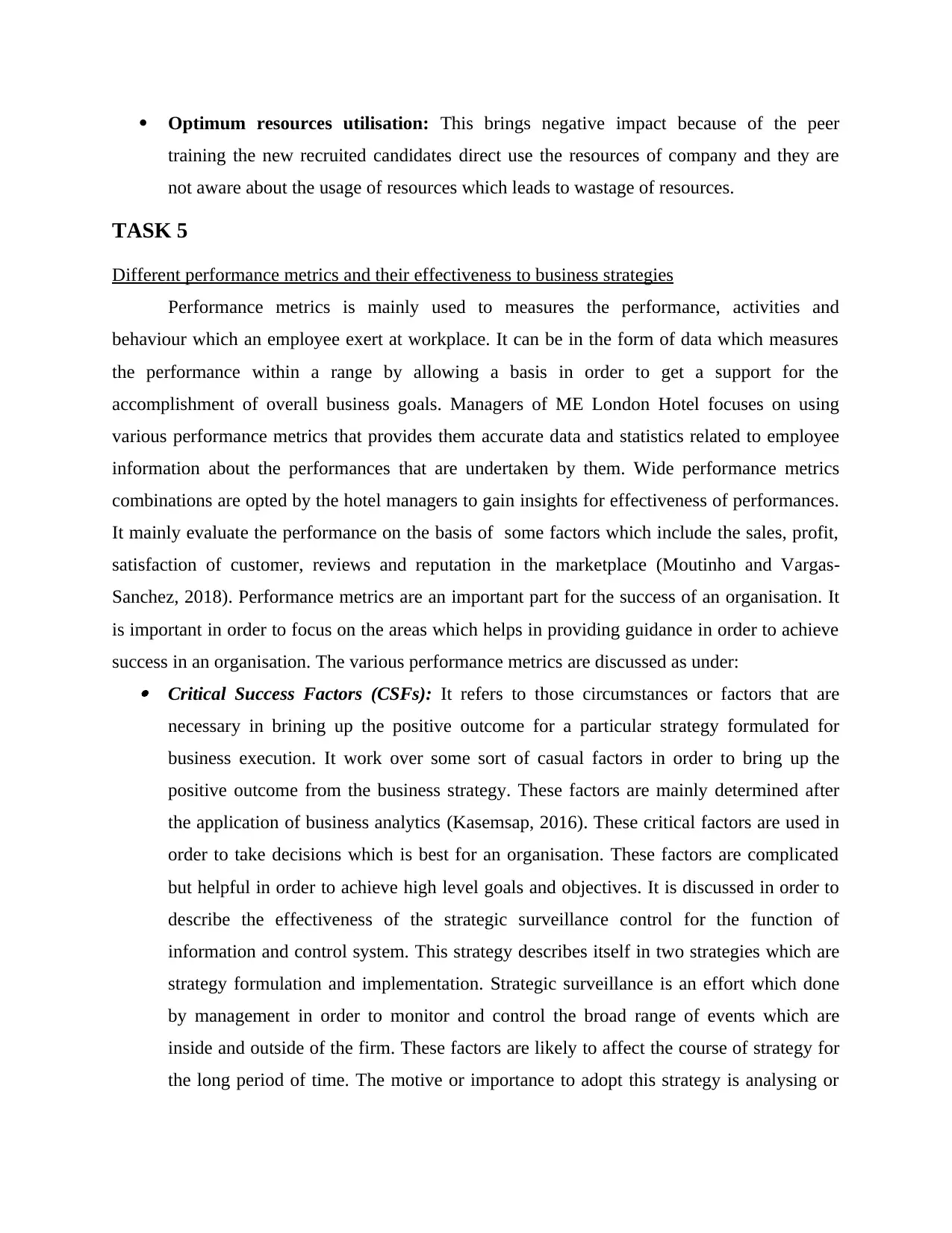
Optimum resources utilisation: This brings negative impact because of the peer
training the new recruited candidates direct use the resources of company and they are
not aware about the usage of resources which leads to wastage of resources.
TASK 5
Different performance metrics and their effectiveness to business strategies
Performance metrics is mainly used to measures the performance, activities and
behaviour which an employee exert at workplace. It can be in the form of data which measures
the performance within a range by allowing a basis in order to get a support for the
accomplishment of overall business goals. Managers of ME London Hotel focuses on using
various performance metrics that provides them accurate data and statistics related to employee
information about the performances that are undertaken by them. Wide performance metrics
combinations are opted by the hotel managers to gain insights for effectiveness of performances.
It mainly evaluate the performance on the basis of some factors which include the sales, profit,
satisfaction of customer, reviews and reputation in the marketplace (Moutinho and Vargas-
Sanchez, 2018). Performance metrics are an important part for the success of an organisation. It
is important in order to focus on the areas which helps in providing guidance in order to achieve
success in an organisation. The various performance metrics are discussed as under: Critical Success Factors (CSFs): It refers to those circumstances or factors that are
necessary in brining up the positive outcome for a particular strategy formulated for
business execution. It work over some sort of casual factors in order to bring up the
positive outcome from the business strategy. These factors are mainly determined after
the application of business analytics (Kasemsap, 2016). These critical factors are used in
order to take decisions which is best for an organisation. These factors are complicated
but helpful in order to achieve high level goals and objectives. It is discussed in order to
describe the effectiveness of the strategic surveillance control for the function of
information and control system. This strategy describes itself in two strategies which are
strategy formulation and implementation. Strategic surveillance is an effort which done
by management in order to monitor and control the broad range of events which are
inside and outside of the firm. These factors are likely to affect the course of strategy for
the long period of time. The motive or importance to adopt this strategy is analysing or
training the new recruited candidates direct use the resources of company and they are
not aware about the usage of resources which leads to wastage of resources.
TASK 5
Different performance metrics and their effectiveness to business strategies
Performance metrics is mainly used to measures the performance, activities and
behaviour which an employee exert at workplace. It can be in the form of data which measures
the performance within a range by allowing a basis in order to get a support for the
accomplishment of overall business goals. Managers of ME London Hotel focuses on using
various performance metrics that provides them accurate data and statistics related to employee
information about the performances that are undertaken by them. Wide performance metrics
combinations are opted by the hotel managers to gain insights for effectiveness of performances.
It mainly evaluate the performance on the basis of some factors which include the sales, profit,
satisfaction of customer, reviews and reputation in the marketplace (Moutinho and Vargas-
Sanchez, 2018). Performance metrics are an important part for the success of an organisation. It
is important in order to focus on the areas which helps in providing guidance in order to achieve
success in an organisation. The various performance metrics are discussed as under: Critical Success Factors (CSFs): It refers to those circumstances or factors that are
necessary in brining up the positive outcome for a particular strategy formulated for
business execution. It work over some sort of casual factors in order to bring up the
positive outcome from the business strategy. These factors are mainly determined after
the application of business analytics (Kasemsap, 2016). These critical factors are used in
order to take decisions which is best for an organisation. These factors are complicated
but helpful in order to achieve high level goals and objectives. It is discussed in order to
describe the effectiveness of the strategic surveillance control for the function of
information and control system. This strategy describes itself in two strategies which are
strategy formulation and implementation. Strategic surveillance is an effort which done
by management in order to monitor and control the broad range of events which are
inside and outside of the firm. These factors are likely to affect the course of strategy for
the long period of time. The motive or importance to adopt this strategy is analysing or
Paraphrase This Document
Need a fresh take? Get an instant paraphrase of this document with our AI Paraphraser
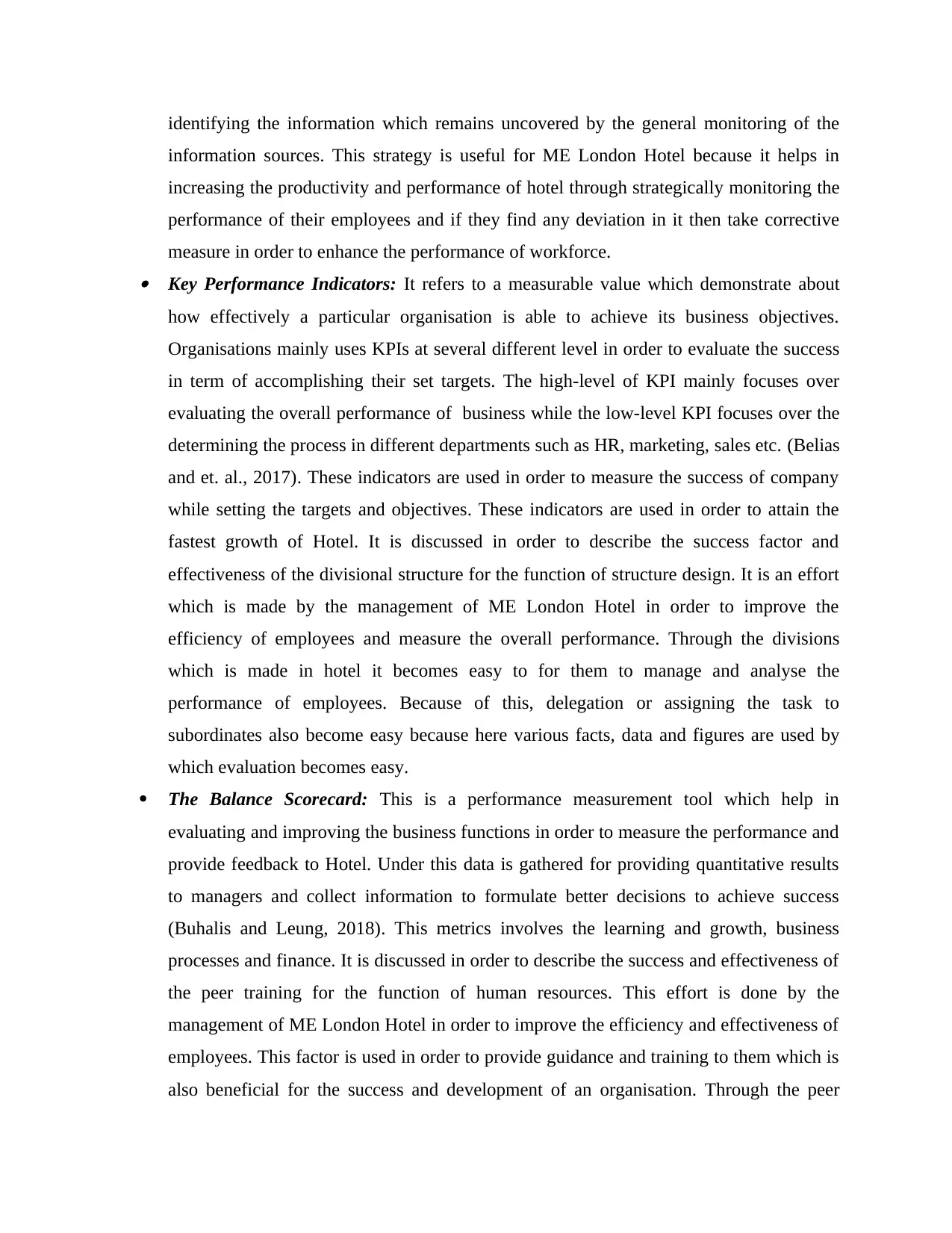
identifying the information which remains uncovered by the general monitoring of the
information sources. This strategy is useful for ME London Hotel because it helps in
increasing the productivity and performance of hotel through strategically monitoring the
performance of their employees and if they find any deviation in it then take corrective
measure in order to enhance the performance of workforce. Key Performance Indicators: It refers to a measurable value which demonstrate about
how effectively a particular organisation is able to achieve its business objectives.
Organisations mainly uses KPIs at several different level in order to evaluate the success
in term of accomplishing their set targets. The high-level of KPI mainly focuses over
evaluating the overall performance of business while the low-level KPI focuses over the
determining the process in different departments such as HR, marketing, sales etc. (Belias
and et. al., 2017). These indicators are used in order to measure the success of company
while setting the targets and objectives. These indicators are used in order to attain the
fastest growth of Hotel. It is discussed in order to describe the success factor and
effectiveness of the divisional structure for the function of structure design. It is an effort
which is made by the management of ME London Hotel in order to improve the
efficiency of employees and measure the overall performance. Through the divisions
which is made in hotel it becomes easy to for them to manage and analyse the
performance of employees. Because of this, delegation or assigning the task to
subordinates also become easy because here various facts, data and figures are used by
which evaluation becomes easy.
The Balance Scorecard: This is a performance measurement tool which help in
evaluating and improving the business functions in order to measure the performance and
provide feedback to Hotel. Under this data is gathered for providing quantitative results
to managers and collect information to formulate better decisions to achieve success
(Buhalis and Leung, 2018). This metrics involves the learning and growth, business
processes and finance. It is discussed in order to describe the success and effectiveness of
the peer training for the function of human resources. This effort is done by the
management of ME London Hotel in order to improve the efficiency and effectiveness of
employees. This factor is used in order to provide guidance and training to them which is
also beneficial for the success and development of an organisation. Through the peer
information sources. This strategy is useful for ME London Hotel because it helps in
increasing the productivity and performance of hotel through strategically monitoring the
performance of their employees and if they find any deviation in it then take corrective
measure in order to enhance the performance of workforce. Key Performance Indicators: It refers to a measurable value which demonstrate about
how effectively a particular organisation is able to achieve its business objectives.
Organisations mainly uses KPIs at several different level in order to evaluate the success
in term of accomplishing their set targets. The high-level of KPI mainly focuses over
evaluating the overall performance of business while the low-level KPI focuses over the
determining the process in different departments such as HR, marketing, sales etc. (Belias
and et. al., 2017). These indicators are used in order to measure the success of company
while setting the targets and objectives. These indicators are used in order to attain the
fastest growth of Hotel. It is discussed in order to describe the success factor and
effectiveness of the divisional structure for the function of structure design. It is an effort
which is made by the management of ME London Hotel in order to improve the
efficiency of employees and measure the overall performance. Through the divisions
which is made in hotel it becomes easy to for them to manage and analyse the
performance of employees. Because of this, delegation or assigning the task to
subordinates also become easy because here various facts, data and figures are used by
which evaluation becomes easy.
The Balance Scorecard: This is a performance measurement tool which help in
evaluating and improving the business functions in order to measure the performance and
provide feedback to Hotel. Under this data is gathered for providing quantitative results
to managers and collect information to formulate better decisions to achieve success
(Buhalis and Leung, 2018). This metrics involves the learning and growth, business
processes and finance. It is discussed in order to describe the success and effectiveness of
the peer training for the function of human resources. This effort is done by the
management of ME London Hotel in order to improve the efficiency and effectiveness of
employees. This factor is used in order to provide guidance and training to them which is
also beneficial for the success and development of an organisation. Through the peer
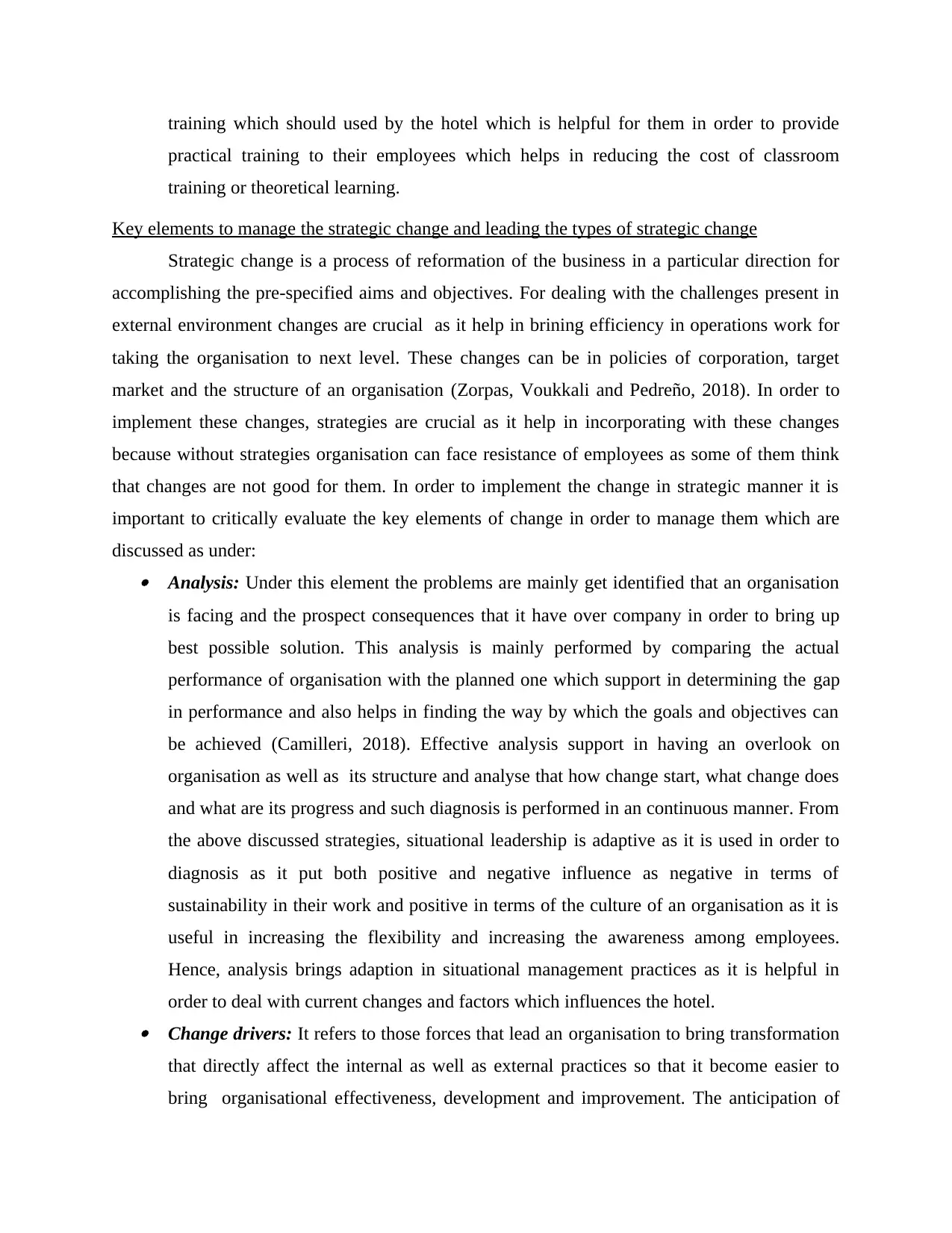
training which should used by the hotel which is helpful for them in order to provide
practical training to their employees which helps in reducing the cost of classroom
training or theoretical learning.
Key elements to manage the strategic change and leading the types of strategic change
Strategic change is a process of reformation of the business in a particular direction for
accomplishing the pre-specified aims and objectives. For dealing with the challenges present in
external environment changes are crucial as it help in brining efficiency in operations work for
taking the organisation to next level. These changes can be in policies of corporation, target
market and the structure of an organisation (Zorpas, Voukkali and Pedreño, 2018). In order to
implement these changes, strategies are crucial as it help in incorporating with these changes
because without strategies organisation can face resistance of employees as some of them think
that changes are not good for them. In order to implement the change in strategic manner it is
important to critically evaluate the key elements of change in order to manage them which are
discussed as under: Analysis: Under this element the problems are mainly get identified that an organisation
is facing and the prospect consequences that it have over company in order to bring up
best possible solution. This analysis is mainly performed by comparing the actual
performance of organisation with the planned one which support in determining the gap
in performance and also helps in finding the way by which the goals and objectives can
be achieved (Camilleri, 2018). Effective analysis support in having an overlook on
organisation as well as its structure and analyse that how change start, what change does
and what are its progress and such diagnosis is performed in an continuous manner. From
the above discussed strategies, situational leadership is adaptive as it is used in order to
diagnosis as it put both positive and negative influence as negative in terms of
sustainability in their work and positive in terms of the culture of an organisation as it is
useful in increasing the flexibility and increasing the awareness among employees.
Hence, analysis brings adaption in situational management practices as it is helpful in
order to deal with current changes and factors which influences the hotel. Change drivers: It refers to those forces that lead an organisation to bring transformation
that directly affect the internal as well as external practices so that it become easier to
bring organisational effectiveness, development and improvement. The anticipation of
practical training to their employees which helps in reducing the cost of classroom
training or theoretical learning.
Key elements to manage the strategic change and leading the types of strategic change
Strategic change is a process of reformation of the business in a particular direction for
accomplishing the pre-specified aims and objectives. For dealing with the challenges present in
external environment changes are crucial as it help in brining efficiency in operations work for
taking the organisation to next level. These changes can be in policies of corporation, target
market and the structure of an organisation (Zorpas, Voukkali and Pedreño, 2018). In order to
implement these changes, strategies are crucial as it help in incorporating with these changes
because without strategies organisation can face resistance of employees as some of them think
that changes are not good for them. In order to implement the change in strategic manner it is
important to critically evaluate the key elements of change in order to manage them which are
discussed as under: Analysis: Under this element the problems are mainly get identified that an organisation
is facing and the prospect consequences that it have over company in order to bring up
best possible solution. This analysis is mainly performed by comparing the actual
performance of organisation with the planned one which support in determining the gap
in performance and also helps in finding the way by which the goals and objectives can
be achieved (Camilleri, 2018). Effective analysis support in having an overlook on
organisation as well as its structure and analyse that how change start, what change does
and what are its progress and such diagnosis is performed in an continuous manner. From
the above discussed strategies, situational leadership is adaptive as it is used in order to
diagnosis as it put both positive and negative influence as negative in terms of
sustainability in their work and positive in terms of the culture of an organisation as it is
useful in increasing the flexibility and increasing the awareness among employees.
Hence, analysis brings adaption in situational management practices as it is helpful in
order to deal with current changes and factors which influences the hotel. Change drivers: It refers to those forces that lead an organisation to bring transformation
that directly affect the internal as well as external practices so that it become easier to
bring organisational effectiveness, development and improvement. The anticipation of
⊘ This is a preview!⊘
Do you want full access?
Subscribe today to unlock all pages.

Trusted by 1+ million students worldwide
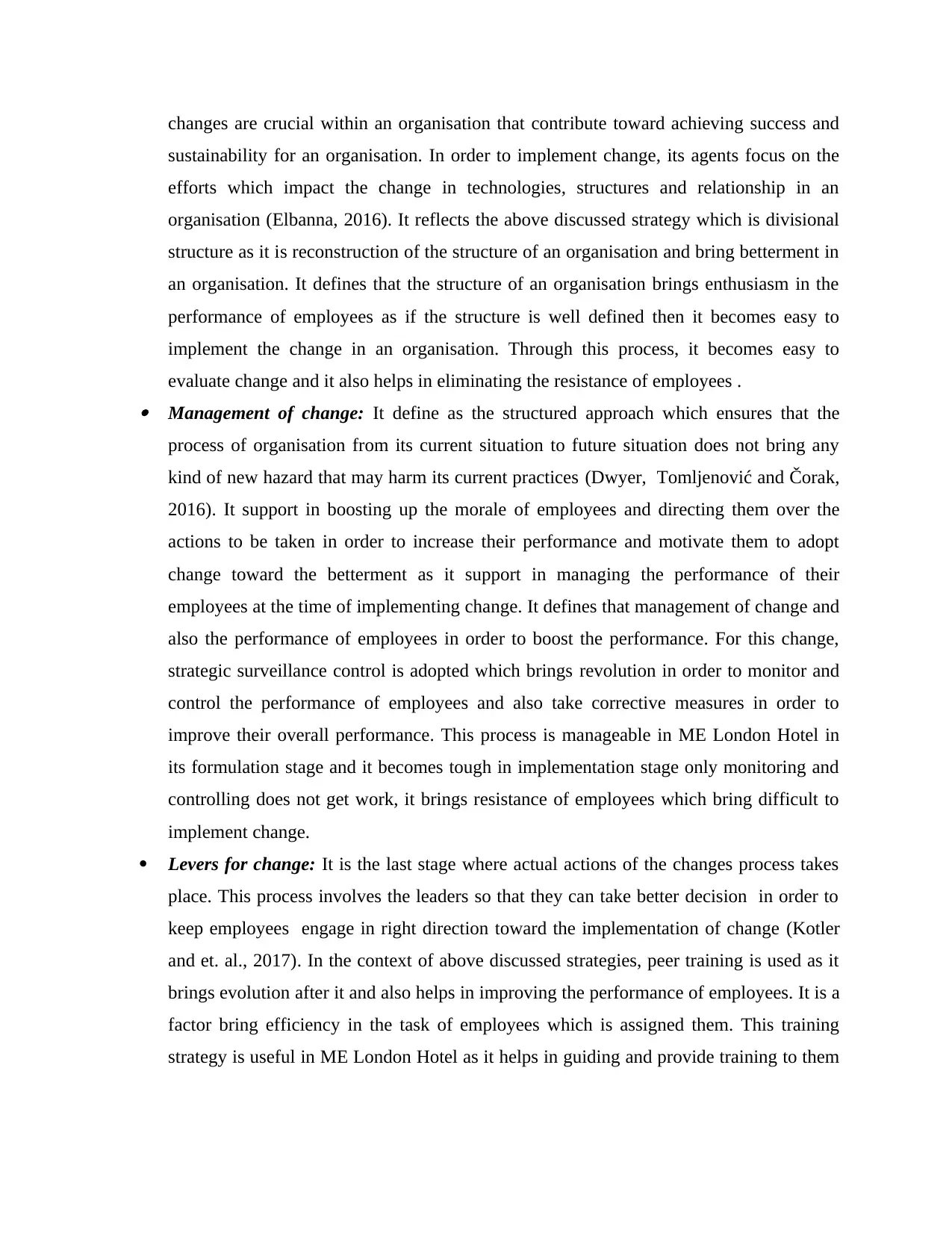
changes are crucial within an organisation that contribute toward achieving success and
sustainability for an organisation. In order to implement change, its agents focus on the
efforts which impact the change in technologies, structures and relationship in an
organisation (Elbanna, 2016). It reflects the above discussed strategy which is divisional
structure as it is reconstruction of the structure of an organisation and bring betterment in
an organisation. It defines that the structure of an organisation brings enthusiasm in the
performance of employees as if the structure is well defined then it becomes easy to
implement the change in an organisation. Through this process, it becomes easy to
evaluate change and it also helps in eliminating the resistance of employees . Management of change: It define as the structured approach which ensures that the
process of organisation from its current situation to future situation does not bring any
kind of new hazard that may harm its current practices (Dwyer, Tomljenović and Čorak,
2016). It support in boosting up the morale of employees and directing them over the
actions to be taken in order to increase their performance and motivate them to adopt
change toward the betterment as it support in managing the performance of their
employees at the time of implementing change. It defines that management of change and
also the performance of employees in order to boost the performance. For this change,
strategic surveillance control is adopted which brings revolution in order to monitor and
control the performance of employees and also take corrective measures in order to
improve their overall performance. This process is manageable in ME London Hotel in
its formulation stage and it becomes tough in implementation stage only monitoring and
controlling does not get work, it brings resistance of employees which bring difficult to
implement change.
Levers for change: It is the last stage where actual actions of the changes process takes
place. This process involves the leaders so that they can take better decision in order to
keep employees engage in right direction toward the implementation of change (Kotler
and et. al., 2017). In the context of above discussed strategies, peer training is used as it
brings evolution after it and also helps in improving the performance of employees. It is a
factor bring efficiency in the task of employees which is assigned them. This training
strategy is useful in ME London Hotel as it helps in guiding and provide training to them
sustainability for an organisation. In order to implement change, its agents focus on the
efforts which impact the change in technologies, structures and relationship in an
organisation (Elbanna, 2016). It reflects the above discussed strategy which is divisional
structure as it is reconstruction of the structure of an organisation and bring betterment in
an organisation. It defines that the structure of an organisation brings enthusiasm in the
performance of employees as if the structure is well defined then it becomes easy to
implement the change in an organisation. Through this process, it becomes easy to
evaluate change and it also helps in eliminating the resistance of employees . Management of change: It define as the structured approach which ensures that the
process of organisation from its current situation to future situation does not bring any
kind of new hazard that may harm its current practices (Dwyer, Tomljenović and Čorak,
2016). It support in boosting up the morale of employees and directing them over the
actions to be taken in order to increase their performance and motivate them to adopt
change toward the betterment as it support in managing the performance of their
employees at the time of implementing change. It defines that management of change and
also the performance of employees in order to boost the performance. For this change,
strategic surveillance control is adopted which brings revolution in order to monitor and
control the performance of employees and also take corrective measures in order to
improve their overall performance. This process is manageable in ME London Hotel in
its formulation stage and it becomes tough in implementation stage only monitoring and
controlling does not get work, it brings resistance of employees which bring difficult to
implement change.
Levers for change: It is the last stage where actual actions of the changes process takes
place. This process involves the leaders so that they can take better decision in order to
keep employees engage in right direction toward the implementation of change (Kotler
and et. al., 2017). In the context of above discussed strategies, peer training is used as it
brings evolution after it and also helps in improving the performance of employees. It is a
factor bring efficiency in the task of employees which is assigned them. This training
strategy is useful in ME London Hotel as it helps in guiding and provide training to them
Paraphrase This Document
Need a fresh take? Get an instant paraphrase of this document with our AI Paraphraser
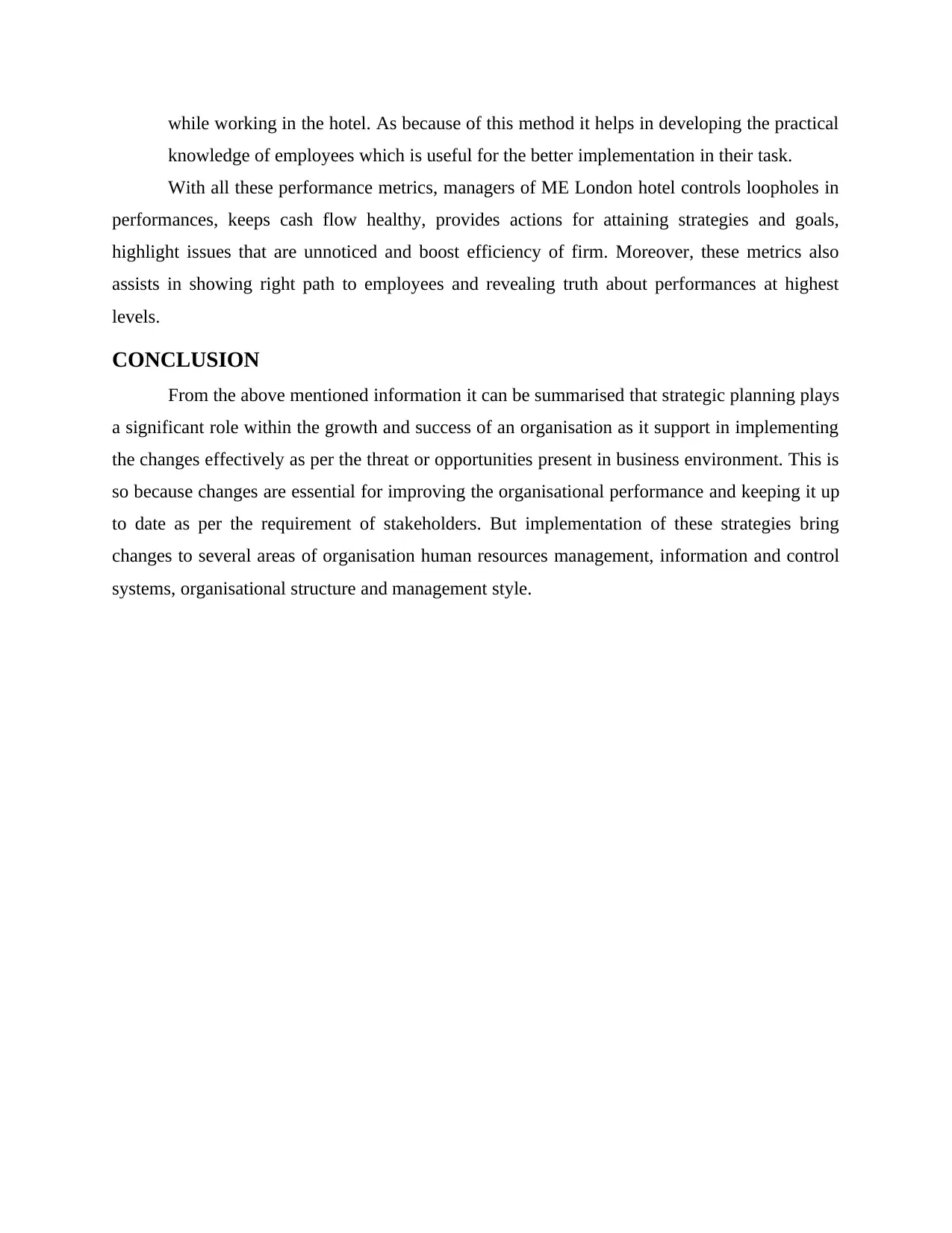
while working in the hotel. As because of this method it helps in developing the practical
knowledge of employees which is useful for the better implementation in their task.
With all these performance metrics, managers of ME London hotel controls loopholes in
performances, keeps cash flow healthy, provides actions for attaining strategies and goals,
highlight issues that are unnoticed and boost efficiency of firm. Moreover, these metrics also
assists in showing right path to employees and revealing truth about performances at highest
levels.
CONCLUSION
From the above mentioned information it can be summarised that strategic planning plays
a significant role within the growth and success of an organisation as it support in implementing
the changes effectively as per the threat or opportunities present in business environment. This is
so because changes are essential for improving the organisational performance and keeping it up
to date as per the requirement of stakeholders. But implementation of these strategies bring
changes to several areas of organisation human resources management, information and control
systems, organisational structure and management style.
knowledge of employees which is useful for the better implementation in their task.
With all these performance metrics, managers of ME London hotel controls loopholes in
performances, keeps cash flow healthy, provides actions for attaining strategies and goals,
highlight issues that are unnoticed and boost efficiency of firm. Moreover, these metrics also
assists in showing right path to employees and revealing truth about performances at highest
levels.
CONCLUSION
From the above mentioned information it can be summarised that strategic planning plays
a significant role within the growth and success of an organisation as it support in implementing
the changes effectively as per the threat or opportunities present in business environment. This is
so because changes are essential for improving the organisational performance and keeping it up
to date as per the requirement of stakeholders. But implementation of these strategies bring
changes to several areas of organisation human resources management, information and control
systems, organisational structure and management style.
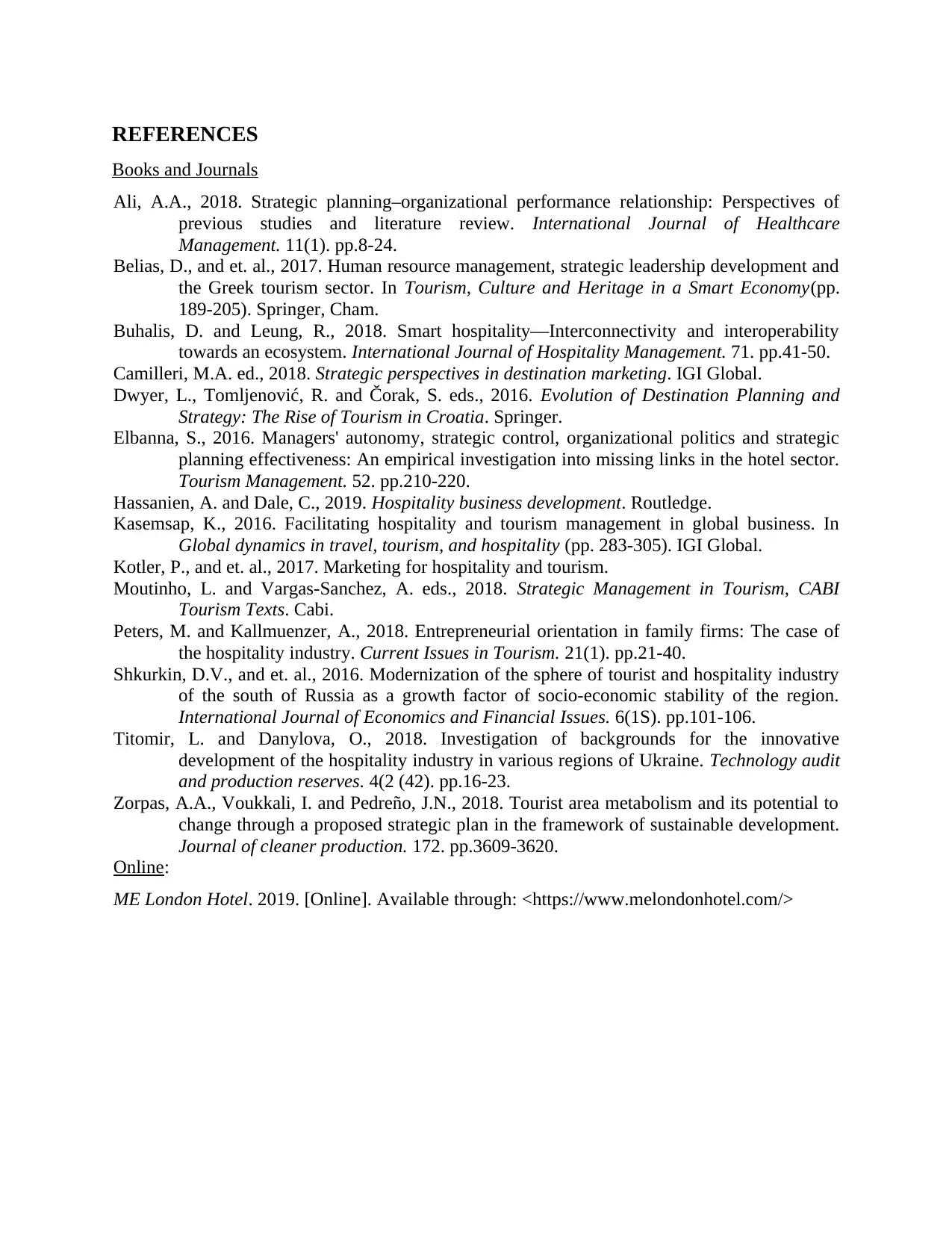
REFERENCES
Books and Journals
Ali, A.A., 2018. Strategic planning–organizational performance relationship: Perspectives of
previous studies and literature review. International Journal of Healthcare
Management. 11(1). pp.8-24.
Belias, D., and et. al., 2017. Human resource management, strategic leadership development and
the Greek tourism sector. In Tourism, Culture and Heritage in a Smart Economy(pp.
189-205). Springer, Cham.
Buhalis, D. and Leung, R., 2018. Smart hospitality—Interconnectivity and interoperability
towards an ecosystem. International Journal of Hospitality Management. 71. pp.41-50.
Camilleri, M.A. ed., 2018. Strategic perspectives in destination marketing. IGI Global.
Dwyer, L., Tomljenović, R. and Čorak, S. eds., 2016. Evolution of Destination Planning and
Strategy: The Rise of Tourism in Croatia. Springer.
Elbanna, S., 2016. Managers' autonomy, strategic control, organizational politics and strategic
planning effectiveness: An empirical investigation into missing links in the hotel sector.
Tourism Management. 52. pp.210-220.
Hassanien, A. and Dale, C., 2019. Hospitality business development. Routledge.
Kasemsap, K., 2016. Facilitating hospitality and tourism management in global business. In
Global dynamics in travel, tourism, and hospitality (pp. 283-305). IGI Global.
Kotler, P., and et. al., 2017. Marketing for hospitality and tourism.
Moutinho, L. and Vargas-Sanchez, A. eds., 2018. Strategic Management in Tourism, CABI
Tourism Texts. Cabi.
Peters, M. and Kallmuenzer, A., 2018. Entrepreneurial orientation in family firms: The case of
the hospitality industry. Current Issues in Tourism. 21(1). pp.21-40.
Shkurkin, D.V., and et. al., 2016. Modernization of the sphere of tourist and hospitality industry
of the south of Russia as a growth factor of socio-economic stability of the region.
International Journal of Economics and Financial Issues. 6(1S). pp.101-106.
Titomir, L. and Danylova, O., 2018. Investigation of backgrounds for the innovative
development of the hospitality industry in various regions of Ukraine. Technology audit
and production reserves. 4(2 (42). pp.16-23.
Zorpas, A.A., Voukkali, I. and Pedreño, J.N., 2018. Tourist area metabolism and its potential to
change through a proposed strategic plan in the framework of sustainable development.
Journal of cleaner production. 172. pp.3609-3620.
Online:
ME London Hotel. 2019. [Online]. Available through: <https://www.melondonhotel.com/>
Books and Journals
Ali, A.A., 2018. Strategic planning–organizational performance relationship: Perspectives of
previous studies and literature review. International Journal of Healthcare
Management. 11(1). pp.8-24.
Belias, D., and et. al., 2017. Human resource management, strategic leadership development and
the Greek tourism sector. In Tourism, Culture and Heritage in a Smart Economy(pp.
189-205). Springer, Cham.
Buhalis, D. and Leung, R., 2018. Smart hospitality—Interconnectivity and interoperability
towards an ecosystem. International Journal of Hospitality Management. 71. pp.41-50.
Camilleri, M.A. ed., 2018. Strategic perspectives in destination marketing. IGI Global.
Dwyer, L., Tomljenović, R. and Čorak, S. eds., 2016. Evolution of Destination Planning and
Strategy: The Rise of Tourism in Croatia. Springer.
Elbanna, S., 2016. Managers' autonomy, strategic control, organizational politics and strategic
planning effectiveness: An empirical investigation into missing links in the hotel sector.
Tourism Management. 52. pp.210-220.
Hassanien, A. and Dale, C., 2019. Hospitality business development. Routledge.
Kasemsap, K., 2016. Facilitating hospitality and tourism management in global business. In
Global dynamics in travel, tourism, and hospitality (pp. 283-305). IGI Global.
Kotler, P., and et. al., 2017. Marketing for hospitality and tourism.
Moutinho, L. and Vargas-Sanchez, A. eds., 2018. Strategic Management in Tourism, CABI
Tourism Texts. Cabi.
Peters, M. and Kallmuenzer, A., 2018. Entrepreneurial orientation in family firms: The case of
the hospitality industry. Current Issues in Tourism. 21(1). pp.21-40.
Shkurkin, D.V., and et. al., 2016. Modernization of the sphere of tourist and hospitality industry
of the south of Russia as a growth factor of socio-economic stability of the region.
International Journal of Economics and Financial Issues. 6(1S). pp.101-106.
Titomir, L. and Danylova, O., 2018. Investigation of backgrounds for the innovative
development of the hospitality industry in various regions of Ukraine. Technology audit
and production reserves. 4(2 (42). pp.16-23.
Zorpas, A.A., Voukkali, I. and Pedreño, J.N., 2018. Tourist area metabolism and its potential to
change through a proposed strategic plan in the framework of sustainable development.
Journal of cleaner production. 172. pp.3609-3620.
Online:
ME London Hotel. 2019. [Online]. Available through: <https://www.melondonhotel.com/>
⊘ This is a preview!⊘
Do you want full access?
Subscribe today to unlock all pages.

Trusted by 1+ million students worldwide
1 out of 12
Related Documents
Your All-in-One AI-Powered Toolkit for Academic Success.
+13062052269
info@desklib.com
Available 24*7 on WhatsApp / Email
![[object Object]](/_next/static/media/star-bottom.7253800d.svg)
Unlock your academic potential
Copyright © 2020–2026 A2Z Services. All Rights Reserved. Developed and managed by ZUCOL.





